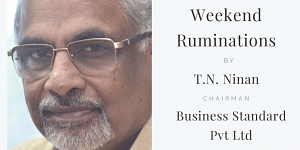Mukesh can look back on a year during which he has shaken up the telecom industry, whereas Anil has been selling one business after another to raise cash.
The tale of the Brothers Ambani has just had another twist. Reliance Communications, the company that younger brother Anil wrested from older sibling Mukesh during an acrimonious parting of ways in 2005-06, has just sold most of its assets to Mukesh’s Reliance Industries for Rs 240 billion.
In a way, this marks apogee and perigee for the two careers. Mukesh, 60, can look back on a year during which he has shaken up the telecom industry with the launch of his Jio service, whereas Anil (two years younger) has been selling one business after another to raise cash. Before RCom’s assets, it was the Mumbai electricity distribution business to Adani for Rs 190 billion. Smaller sales earlier had been of the direct-to-home (DTH) business, the radio and TV businesses, and Big Cinemas. And still there is big debt left to be paid off, so the next sale could be of RCom’s real estate assets.
When father Dhirubhai was around, it used to be Anil who was all flash and smart deals, and the group’s quick-talking face to the media, while Mukesh laboured at putting hard assets in the ground. Once Dhirubhai had passed on, Anil found that he had little to do in the main company. In the inevitable parting of ways, he was offered little more than the smaller companies he ran: Reliance Capital and Reliance Energy (earlier BSES).
It took an almighty fight, with much washing of dirty linen in public, before Mukesh reluctantly parted with his pet new project: What was then Reliance Infocomm, and is now Reliance Communications or RCom. That made the split less uneven than it otherwise might have been, but Mukesh remained by far the bigger player, with businesses valued then at Rs 1,181 billion compared to Anil’s Rs 763 billion. The real imbalance was still greater, because Mukesh’s slice of the cake was 90 per cent or more of the total when it came to sales and profits.
 Still, it was Anil who set the initial pace. Rapid customer acquisition saw the telecom business value reaching Rs 1,690 billion at one stage; today that is down to Rs 100 billion as market share has collapsed. Reliance Power did a spectacular public issue at the height of the stock market boom in early 2008: A company with virtually no revenue or cash flow was valued at Rs 1,018 billion. Today, that is down to Rs 141 billion. Along the way, both companies had faced a Mukesh block: RCom was prevented from leapfrogging in scale through the acquisition of MTN, a South African multinational, because Mukesh said he had a prior claim on any share sale; Mukesh also won a court case over the promise of gas supply to Anil’s power projects under the family settlement.
Still, it was Anil who set the initial pace. Rapid customer acquisition saw the telecom business value reaching Rs 1,690 billion at one stage; today that is down to Rs 100 billion as market share has collapsed. Reliance Power did a spectacular public issue at the height of the stock market boom in early 2008: A company with virtually no revenue or cash flow was valued at Rs 1,018 billion. Today, that is down to Rs 141 billion. Along the way, both companies had faced a Mukesh block: RCom was prevented from leapfrogging in scale through the acquisition of MTN, a South African multinational, because Mukesh said he had a prior claim on any share sale; Mukesh also won a court case over the promise of gas supply to Anil’s power projects under the family settlement.
But there were other reasons too for the change in fortunes. So while Anil’s businesses in their pomp were valued once at nearly Rs 4,000 billion, the figure is down more than 80 per cent, to Rs 730 billion — compared to Mukesh’s Reliance Industries today at nearly Rs 6,000 billion. In terms of personal wealth, Forbes ranks Mukesh as the wealthiest man in Asia, with $38 billion, while Anil is 45th in India, with $3.1 billion.
Mukesh’s new businesses — oil and gas, retail — have not been great successes, while telecommunications will have to prove it can earn a good return on capital. The cash cows remain the refining and petrochemical businesses. While investors in Reliance have had to play a game of patience for long stretches, for Anil, the challenge is to do what used to be his brother’s forte — generating cash by putting assets in the ground and making things. Reliance Infrastructure is laying down roads, bridges and metro projects; Reliance Power is building a dozen power projects; and the defence business is into shipbuilding and aviation components. Even if he pulls off what is for him a relatively new game, Anil still has a pile of debt to clear. Meanwhile, Mukesh has abundant cash flow.
By Special Arrangement with Business Standard.




It is the ruinous policy if UNFETTERED INHERITANCE that created this ECONOMIC BLACK HOLE it shall not only swallow business but also society. This situation was well envisioned by pioneers of free market like Adam Smith and Thomas Pine. These visionaries safeguarded their societies by rationalizing inheritance. Today countries that follow UNFETTERED INHERITANCE are steeped in a quagmire of corruption and misgovernence.
UNFETTERED INHERITANCE plagues a democracy into a oligarchy that seamlessly mutates to a kleptocracy. The society becomes a tinderbox and disaster strikes sooner than later. Pakistan India China all follow UNFETTERED INHERITANCE policy …What a tinderbox it will make…Russia too follows UNFETTERED INHERITANCE ..God be with us
Anil company has to pay lot of bills to the small contractors in Hyderabad,small contractors are crying,because they put lot of investments in the Ofc contract works,no body is responding in the company since 2007
It just a talent that pays off. Hats off to Mukesh Ambani. With your sheer vision and determination you will always be a hero and you are true heir of your great father..
Blood against own blood ? Instead of lifting up brother mukesh is ruining ANil.In no time same thing can happen to his own children
Time has separated the men from the boys.